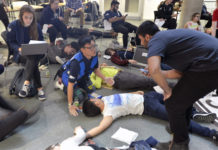Executive candidates in the Feds election race gathered for a debate hosted by the current Feds exec on Wednesday. This is the last formal debate between executive candidates before the voting period begins.
The current executive asked questions based on specific candidate platform points as well as the candidates’ statements made at the previous week’s debate hosted by <em>Imprint.</em> The format allowed for candidates running for each position to rebut statements and pose their own questions to other candidates.
The debate began with presidential candidates discussing student engagement, specifically within students’ council.
The first question, posed by current President David Collins was, “What will you do as president to ensure student councilors are engaging in open and honest communication?”
Team Green candidate, Moe Bdeir quoted a message from David Collins’ presidential campaign the previous year, “Feds is on the brink of irrelevancy.” Bdeir used this message to promote the idea that councilors should be elected by each society.
“If councilors are representing their faculties, then faculties should control who is elected,” said Bdeir.
A major part of the presidential debate was student space, a hot topic during this year’s election period.
Questions were posed to specific candidates based on their platforms, however all candidates had time to answer or add to them. Team Nova candidate Jesse McGinnis was asked about the absence of athletic space in his plan to expand and improve student space.
No candidate mentioned plans to expand athletic space.
“We’ve discussed with athletics and with the varsity teams ways to improve the collaboration between athletics and Feds and I think that would go hand in hand with providing more space that athletics feel like they’re welcome,” said Danielle Burt of Team Spark. She did not have specific plans to create new, or renovate existing, athletic space.
“I think athletic space is not a top priority, it is a priority, but I feel student space such as study space and socializing space is more important at this time than athletic space,” said Bdeir. He sympathized with the fact that both CIF and the PAC are often crowded, but had no concrete plans to address that issue.
McGinnis defended his platform saying he wants to focus on “multi-purpose space” that can be accessed by all students.
Another controversial issue was discussed during the VP internal debate when Team Nova candidate Anjali Gopal questioned Team Spark’s Maaz Yasin about prioritizing campus prayer space over student mental health and wellness. Advocating for mental health support is a major aspect of Gopal’s platform.
“Mental health [sic] one in five students suffer from it whereas prayer, maybe like a few hundred students on campus find that very important,” said Gopal.
Mental health, while it is a huge part of our platform, it is a huge part of our presidential platform and [Danielle] would be doing most of the lobbying,” said Yasin.
Much like the presidential debate, the VP internal debate came down to a discussion of space and how, with rising enrolment numbers, will candidates find the physical space to carry out much of their platforms.
“We need to focus on space that is accessible and central for students,” said Yasin.
Gopal also questioned Team Green candidate Saleem Khan’s plans to address mental health issues on campus with a de-stressing room and how it would help with mental illnesses like depression and anxiety.
Khan said mental health and mental illness are two different topics and his plans are meant to address mental health and wellness. He plans to implement a meditation room for students and “a regular puppy room,” to combat student stress.
“I think mental illness is something which is not under [Feds],” said Khan.
The VP operations and finance debate focused on managing full time feds staff while the VP education debate involved advocating for students at both the federal and provincial level.































